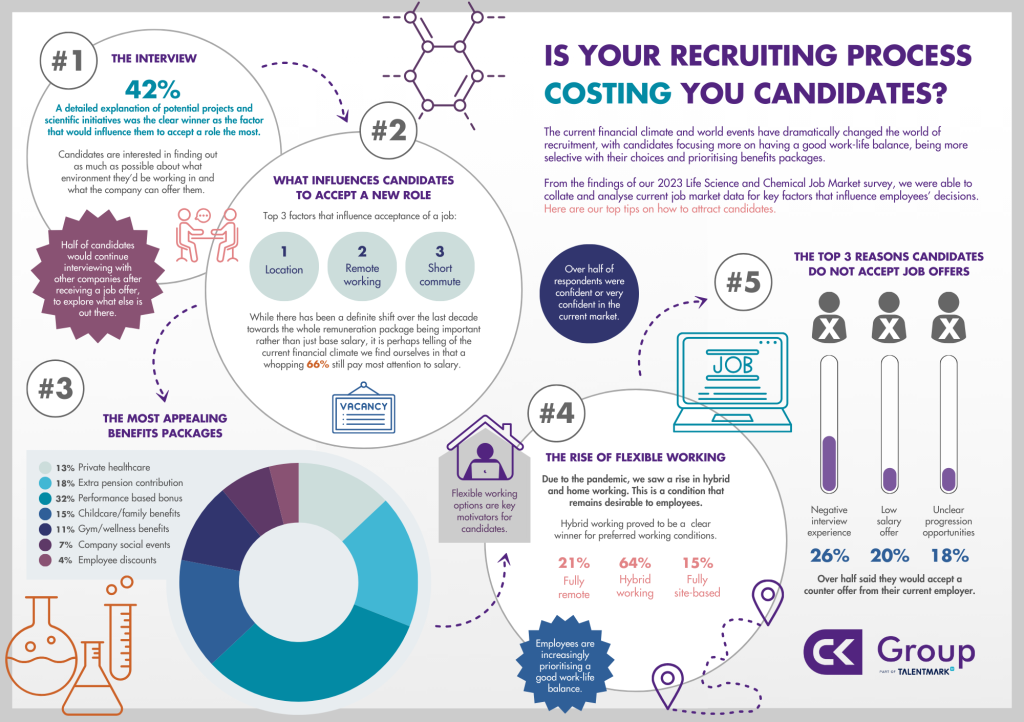Here at CK Group we have a unique insight into the life science job market. We are in a privileged position to offer advice to both our clients and candidates, so that you know the best way to navigate within the sector.
We asked our Life Science Recruitment Manager, Jade Stirk, to answer a few questions and to share her expertise with you all.
Could you briefly introduce yourself and your background in scientific recruitment?
I joined CK Group in 2013, where I focused on recruiting for contract roles within our science contracts team. Recently, I’ve been promoted to Recruitment Manager, and now my main focus is on recruitment within GMP Manufacturing in the Life Science industry across the UK. My specialist areas include Laboratory, Process, Production, and Quality related roles.
Industry Trends and Demands
What are the current trends you’re observing in the Life Science sector?
I have noticed that a lot of our contract manufacturing clients are the ones who are actively recruiting now and there seems to be a big increase in contract positions.
Are there specific scientific fields or disciplines that are in high demand at the moment? Why?
Experienced QC Analysts are in demand within GMP-regulated industries. I believe this is down to production levels increasing, meaning more testing required in the laboratory.
How do you think global events (e.g. pandemics, technological advancements) have influenced the demand for scientific talent?
The manufacturing industry is always impacted by global events. You see a pattern in the demands of clients making more products, but then the lows of when it is on hold – there always seems to be a global reason as to why. Overall, these events can lead to shifts in priorities, funding, and career opportunities within the scientific community.
Skill Sets and Qualifications
What are some of the key skills and qualifications employers are seeking in candidates today?
For most of our roles we ask for experience in a GMP-regulated environment as a base skill. The trends we are seeing with increasing demand are for candidates with experience working with HPLC, GC and LCMS.
Are there any emerging skills or areas of expertise that are becoming increasingly important?
In our industry we are seeing a demand for hands-on experience in industry, and not many opportunities for fresh graduates. This could be because companies are looking for people to come in and hit the ground running, having already gained the skills required in an industry setting.
Challenges and Opportunities
What are some common challenges that organisations face when recruiting?
A slow recruitment process is a big challenge we face currently, as when someone good is looking for a new role you need to act fast to get them offered.
In your experience, what strategies have been effective in overcoming these challenges?
Raising awareness to clients that good candidates are in demand, and they need to act fast.
Diversity and Inclusion
What initiatives or practices have you observed that promote diversity and inclusion in scientific workplaces?
I’ve observed several initiatives and practices aimed at promoting diversity and inclusion in scientific workplaces, including:
- Diversity hiring programs – many organisations implement targeted recruitment efforts to attract diverse talent, ensuring a more inclusive workforce.
- Training and workshops – workshops and training sessions on unconscious bias, cultural competence, and inclusive leadership can raise awareness and create a more inclusive environment.
- Flexible work policies – flexible work arrangements accommodate diverse needs, such as caregiving responsibilities or disabilities, promoting a good work-life balance.
- Transparent promotion processes – clear criteria and evaluation metrics for promotions help mitigate bias and ensure equal opportunities for advancement.
Looking to the Future
Are there any emerging trends or developments that you anticipate will shape the landscape of scientific talent acquisition in the coming years?
Technological advancements like AI will start to shape talent acquisition more in the future, but you will always need a good recruiter who can screen your candidates and give a more personal response.
Thank you, Jade, for sharing your valuable insights with us today. Is there any additional advice or final thoughts you’d like to leave our audience with regarding scientific recruitment?
At CK Group, teamwork is at our core, and delivering exceptional service is our mission. While we may not shout about it often, our team boasts an impressive 70% fill rate, a testament to our commitment to excellence in recruiting. This ratio is well above industry average!
If you have a role to fill and need help, please get in touch today.
If there are any further questions you have or if you require further clarification on any points discussed, contact Jade at jstirk@ckgroup.co.uk.
Read more advice on getting the most out of your recruitment strategy on our Client Advice Centre.
